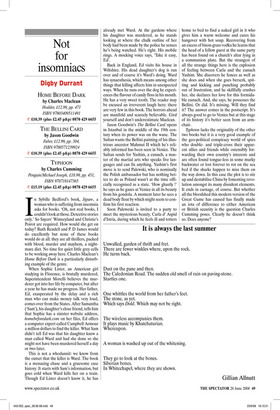Not for insomniacs
Digby Durrant
HOME BEFORE DARK by Charles Maclean Hodder, £12.99, pp. 471 ISBN 97803409511491 ✆ £10.39 (plus £2.45 p&p) 0870 429 6655 THE BELLINI CARD by Jason Goodwin Faber, £12.99, pp. 304, ISBN 9780571239924 ✆ £10.39 (plus £2.45 p&p) 0870 429 6655 TYPHOON by Charles Cumming Penguin/Michael Joseph, £18.99, pp. 451, ISBN 978718147365 ✆ £15.19 (plus £2.45 p&p) 0870 429 6655 In Sybille Bedford’s book, Jigsaw, a woman who is suffering from insomnia asks for books. ‘Oh, not real books, I couldn’t look at those. Detective stories only.’ So Sayers’ Wimseyland and Christie’s Poirot are required. How would she get on today? Ruth Rendell and P. D James would do excellently but none of these books would do at all: they are all thrillers, packed with blood, murder and mayhem, a nightmare diet. No time for quiet little grey cells to be working away here. Charles Maclean’s Home Before Dark is a particularly disturbing example of the genre.
When Sophie Lister, an American girl studying in Florence, is brutally murdered, Superintendent Morelli believes the murderer got into her life by computer, but after a year he has made no progress. Her father, Ed, exasperated by the delay and a rich man who can make money talk very loud, comes over from the States. After Samantha (‘Sam’), his daughter’s close friend, tells him that Sophie has a sinister website address, homebeforedark.com on her files, Ed offers a computer expert called Campbell Armour a million dollars to find the killer. What Sam didn’t tell Ed was that his daughter knew a man called Ward and had she done so she might not have been murdered herself a day or two later.
This is not a whodunnit: we know from the outset that the killer is Ward. The book is a menacing chase and a gruesome case history. It starts with Sam’s information, but goes cold when Ward kills her on a train. Though Ed Lister doesn’t know it, he has already met Ward. At the gardens where his daughter was murdered, as he stands looking at where the chalk outline of her body had been made by the police he senses he’s being watched. He’s right. His mobile rings. A mocking voice says, ‘Take it easy, Ed’.
Back in England, Ed visits his house in Wiltshire. His dead daughter’s dog is run over and of course it’s Ward’s doing. Ward has synaesthesia, which means among other things that killing affects him in unexpected ways. When he runs over the dog he experiences the flavour of candy floss in his mouth. He has a very sweet tooth. The reader may be excused an irreverent laugh here: there are very few in this book. The horrors ahead are manifold and scarcely believable. Gird yourself and don’t underestimate Maclean.
Jason Goodwin’s The Bellini Card opens in Istanbul in the middle of the 19th century when its power was on the wane. The Sultan wants the Bellini painting of his illustrious ancestor Mahmut II which he’s reliably informed has been seen in Venice. The Sultan sends for Yashim, a eunuch, a master of the martial arts who speaks five languages and can fix anything. Yashim’s first move is to send Palewski, who is nominally the Polish ambassador but has nothing better to do as Poland wasn’t at the time officially recognised as a state. ‘How ghastly !’ he says as he gazes at Venice in all its beauty from his gondola. A moment later he sees a dead body float by which might seem to confirm his first reaction.
Soon Paleweski is invited to a party to meet the mysterious beauty, Carla d’ Aspid d’Istria, during which he feels ill and totters home to bed to find a naked girl in it who gives him a warm welcome and cures his hangover with hot soup. Recovering from an excess of bison-grass vodka he learns that the head of a fellow guest at the same party has been found on a church’s altar lying in a communion plate. But the strangest of all the strange things here is the explosion of feeling between Carla and the eunuch Yashim. She discovers he fences as well as she does and when she goes berserk, spitting and kicking and punching probably out of frustration, and he skillfully crushes her, she declares her love for this formidable eunuch. And, she says, he possesses the Bellini. Or did. It’s missing. Will they find it? The answer comes in the postscript. It’s always good to go to Venice but at this stage of its history it’s better seen from an armchair.
Typhoon lacks the originality of the other two books but it is a very good example of the geo-political conspiracy world of spies who doubleand triple-cross their apparent allies and friends while ostensibly forwarding their own country’s interests and are often found tongue-less in some murky backwater or lost forever to rot on the sea bed if the sharks happen to miss them on the way down. In this case the plot is to stir up and destabilise China by fomenting revolution amongst its many dissident elements. It ends in carnage, of course. But whether all the bloodshed this modern version of the Great Game has caused has finally made an iota of difference to either American or British security is the question Charles Cumming poses. Clearly he doesn’t think so. Does anyone?


















































































 Previous page
Previous page